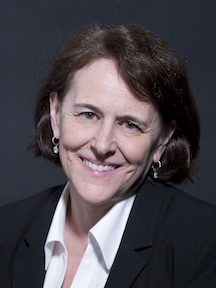By Francesca Paris
By the time Therese Bottomly (ΦBK, University of Oregon) was named editor and vice president of content at The Oregonian/OregonLive in early September, she had already worked in the paper’s newsroom for over three decades.
The Portland native arrived at The Oregonian fresh from her undergraduate education at the University of Oregon in 1983. She had studied journalism at the university, but she’d never worked at a high school or college paper.
Instead, she says, she studied broadly across the university’s curriculum, from psychology to economics to history, after starting out as a Latin and linguistics student.
“I really enjoyed those subjects but wasn’t sure how they would prepare me for a career,” she said. “The journalism curriculum appealed to me… because of its broad liberal arts requirements.”
While she was a student, a campus newspaper item about Phi Beta Kappa caught her eye, and she decided to make membership her goal. Meanwhile, a professor nominated her for a copy editing internship at Oregon’s largest newspaper, The Oregonian. Two days after graduation, she started working in the newsroom.
Over the next 35 years she would move through the paper, taking on more responsibility with each new position. Working at the same institution for her entire career, in management positions since she was 24 years old, was a boon. She has served in senior leadership roles at the paper since 1998.
“I have been lucky enough to have bosses who always challenged me and made sure I was constantly learning,” Bottomly said. “My bosses moved me regularly to more and more responsible positions, and I felt I was developing professionally just about every year.”
Grounding herself in the institution was especially helpful when the newspaper itself went through changes. During her tenure at the paper, The Oregonian received six Pulitzer Prizes. She oversaw the paper’s coverage of the 1998 mass school shooting at Thurston High, and a 41-day occupation of Malheur National Wildlife by armed protestors.
Her familiarity with the institution through the years, she says, helped her focus on the fundamentals of journalism, even as the paper itself changed.
A huge part of that change was the paper’s turn towards digital. Bottomly helped lead that shift, which moved the paper from a traditional print newspaper cycle, turning in stories by the end of the day then moving them through the editing and layout process, to a system that focuses on immediate postings on the website. The paper also changed its budgeting system to prioritize website offerings.
She says the process was challenging, but instructive. “We’ve all learned new skills like video production and search engine optimization.”
Part of her job is to apply those skills to support local journalism. She says she’s focused on offering readers across the state the news that is relevant to them.
“There will always be a place for local news you can get nowhere else.”
Her advice for undergraduates in the liberal arts and sciences who want to be journalists? As much as possible, learn multimedia skills.
“The digital tools for storytelling are amazing and allow us to produce journalism that appeals widely.” And she adds, be an optimist. As she says, “it’s an exciting time to be in this business.”
Francesca Paris (ΦBK, Williams College) recently completed her bachelor’s degree in statistics and Arabic studies and is currently interning at NPR. Williams College is home to the Gamma of Massachusetts Chapter of Phi Beta Kappa.




